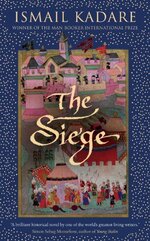Il est précisé que ce livre est une fiction, avec des noms, des personnes, des lieux et des événements fictifs et inventés. Son réalisme et la grande connaissance des pratiques guerrière de terrain et en temps de siège pourraient effectivement faire penser que l’auteur fait la narration de réels événments historiques. Toutefois, l’époque et les régions sont évoquées avec brio et il est tentant, sinon facile, de faire un parallèle avec l’histoire véridique des campagnes menées par l’empire Ottoman et les conquêtes musulmanes du XVe siècle.
p. 14
At the same time, however, it was clear that by sending him off to fight Skanderbeg, the Sultan was giving him one last chance.
It wasn’t the first time the Padishah had acted in this way. He always appointed men who were playing their last card to head the most hazardous expeditions, well aware that the fiercest of warriors are those with their backs to the wall.
p. 109
Maybe a learned man and an unschooled one, when they serve the same cause, produce an alloy far stronger than two learned men or two unschooled men, just as bronze is harder than either the copper or the tin from which it is made.
p. 119-120
As he sauntered towards the tent of his unit’s quartermaster, he worked out in his head how many months of his pay of forty-five aspers a month he would have to save up to accumulate two hundred, which was half the going price for a girl of average looks, and the third of the price of a blonde. [...] Sometimes he was overcome with panic at the thought that he might perhaps never again have an opportunity to enjoy a woman, and at such moments he would have given not just his life savings, but several years of his life to escape such a fate.
p. 277
Old Tavxha broke in. "I remember that at the first siege of Szemendre we spent a week flinging rats, dogs and even dead donkeys into the fortress. Then they took to catapulting the corpses of prisoners, and the minders of the machine got so carried away that they started hurling vats of waste water, night soil, and god knows what else over the walls. Sure, the defenders caught diseases and finally surrendered, but what was the point ? The stink was so sickening that our soldiers wouldn’t go into the place once it was ours. The risk of infection cooled their ardour ! So there was no booty, no captives were taken, and the victory was a miserable one. I think I’m right in saying that it’s since that occasion that we’ve not been allowed to catapult filth. But as for live animals, that’s a different question. I’m not against it."
 Kadare, Ismail
Kadare, Ismail
